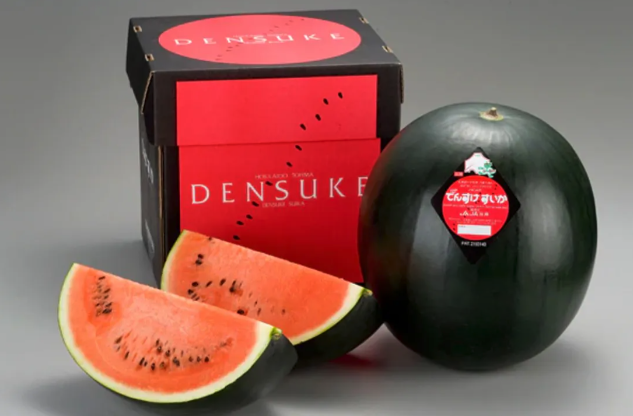Mysterious Allure of Densuke Watermelons

It’s a fruit that defies expectations, challenging the conventional image of a watermelon with its sleek, obsidian skin. The Densuke watermelon is a culinary enigma, and to truly appreciate its allure, we must delve beyond its striking appearance.
The first thing that strikes you about a Densuke watermelon is its appearance. While most watermelons sport a green exterior, the Densuke is entirely black. This dark hue isn’t just for show; it’s a result of its unique genetic makeup. The contrast between the inky black rind and the vibrant ruby-red flesh inside is nothing short of mesmerising.
But the allure of the Densuke watermelon goes beyond aesthetics. These melons hail from Hokkaido, Japan’s northernmost island, known for its harsh climate and limited agricultural space. In this challenging environment, they are cultivated with meticulous care. Each melon is nurtured like a precious gem, with close attention to factors like soil quality, temperature, and humidity. This level of dedication contributes to their rarity, making them more than just a fruit – they are a testament to the delicate balance between tradition and innovation.

Of course, the price often raises eyebrows. They are not your average fruit in terms of cost, but there’s more to it than meets the eye. Owning one is not merely about indulging in a delicious treat; it’s a status symbol. In Japan, it’s a symbol of luxury and exclusivity. Imagine showing up at a summer picnic with one of these in hand – you’d instantly become the center of attention.
The process of acquiring a Densuke watermelon adds an element of excitement and competition to the mix. These melons are often sold at auctions, and the highest bidder gets to take home the coveted black gem. The thrill of competing for the privilege of purchasing one of these watermelons is quite intense, turning the fruit into more than just a food item; it becomes an experience in itself.

Once cut open, a Densuke watermelon it reveals the true treasure within. The black exterior gives way to a luscious, ruby-red flesh that’s incredibly sweet. It’s a stark contrast and a delightful surprise that elevates the experience to a whole new level. The Densuke watermelon is said to be a treat for the senses, and its succulent, sugary flesh makes it a sought-after delight for those with the most discerning palates.
But the allure of Densuke watermelons extends beyond simply slicing them up for a refreshing treat. Japanese chefs have found ingenious ways to incorporate this unique fruit into their culinary creations. From exquisite desserts from watermelon sorbet to inventive cocktails that feature its distinct flavour, the Densuke watermelon serves as the highlight on a canvas of culinary creativity. It’s more than just a fruit; it’s a source of inspiration in the kitchen.
However, the exclusivity and price tag come with their fair share of dilemmas and debates. The high demand and limited supply raise concerns about sustainability and accessibility. Some argue that the intense cultivation and high prices encourage overconsumption and waste. Others believe it’s a necessary luxury in an age where simple pleasures can sometimes be overshadowed by mass production. The scarcity of Densuke watermelons can also make them an elusive treat for many. Their limited availability outside of Japan and the hefty price tag can make you question whether you’d ever get to taste one. But, perhaps, that’s part of their allure for most mortal – they remain an enigma for most and a delightful discovery for the fortunate few.
The Densuke watermelon is more than just a fruit; it’s an experience waiting to be savoured. Whether you’re pondering the ethical implications, dreaming of a taste, or simply admiring its mystique. It is a fascinating enigma in the world of fruits. It’s a symbol of exclusivity, luxury, and the culinary creativity that knows no bounds. It’s an experience that transcends the ordinary, offering a unique blend of aesthetics and taste. If you ever come across a Densuke watermelon in a Japanese market or hear about its extravagant price, remember that it’s not just a fruit – it’s a journey into the world of intrigue and status symbolism, and a celebration of the extraordinary.
All materials reproduced in good faith – copyright of their respective owners




